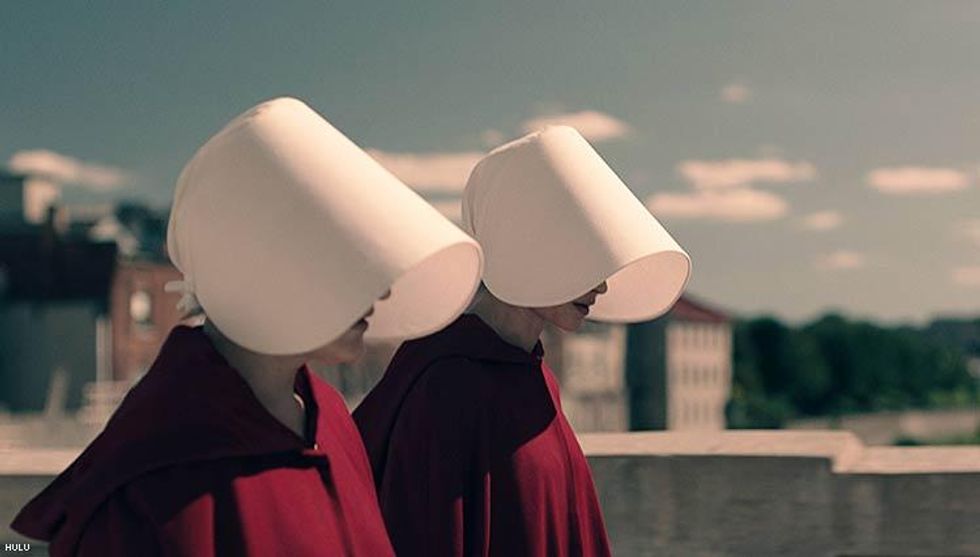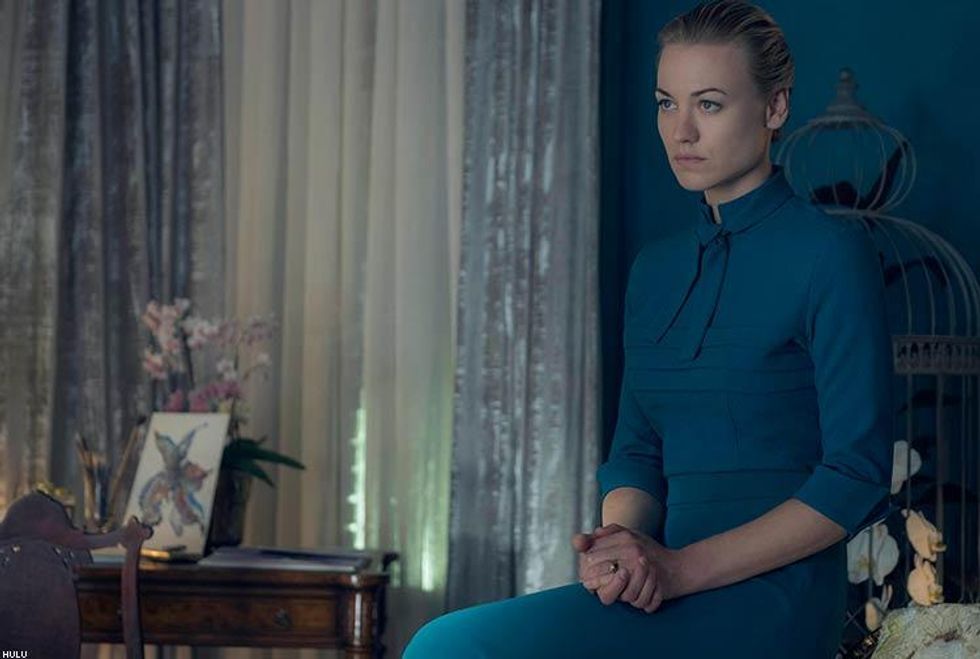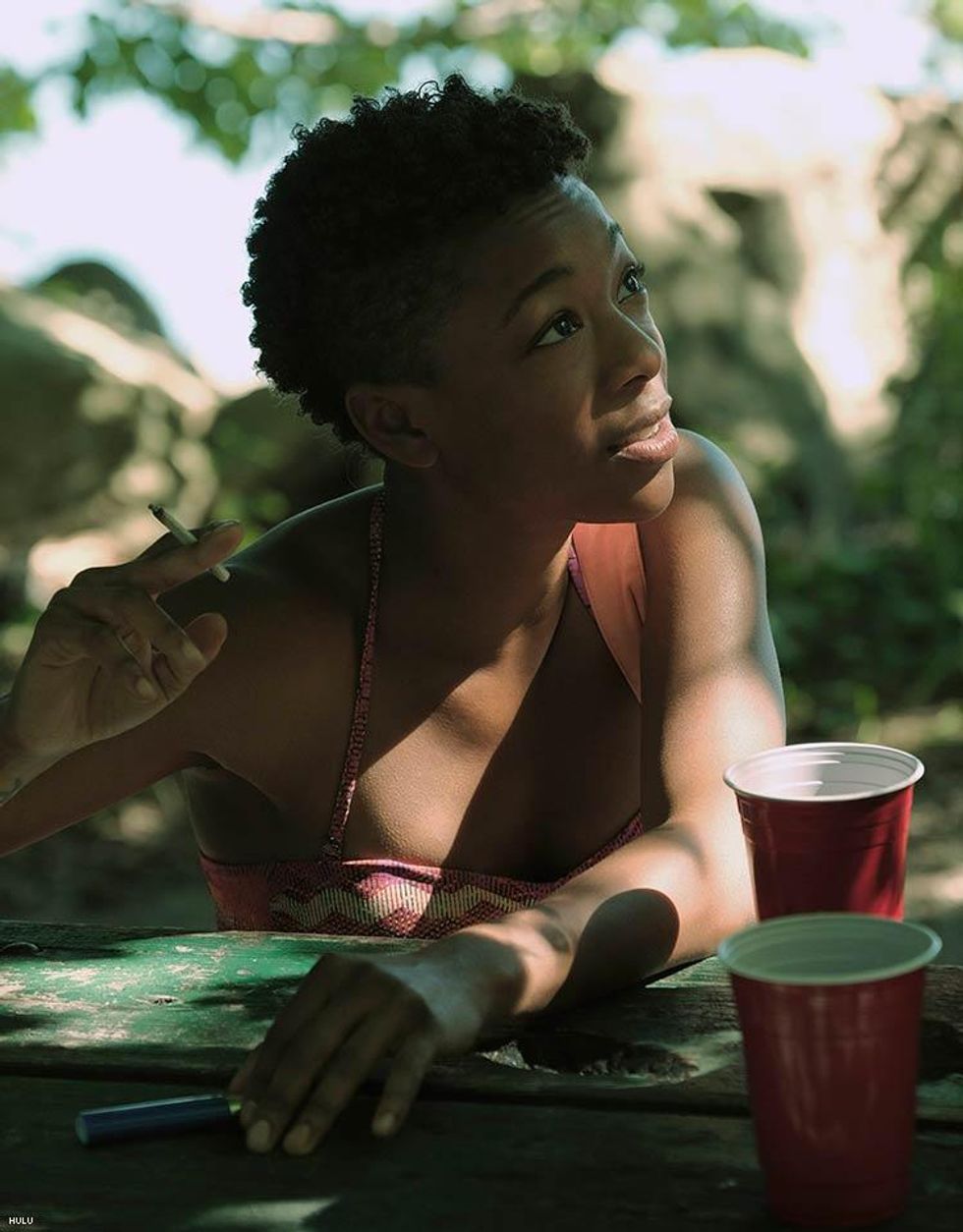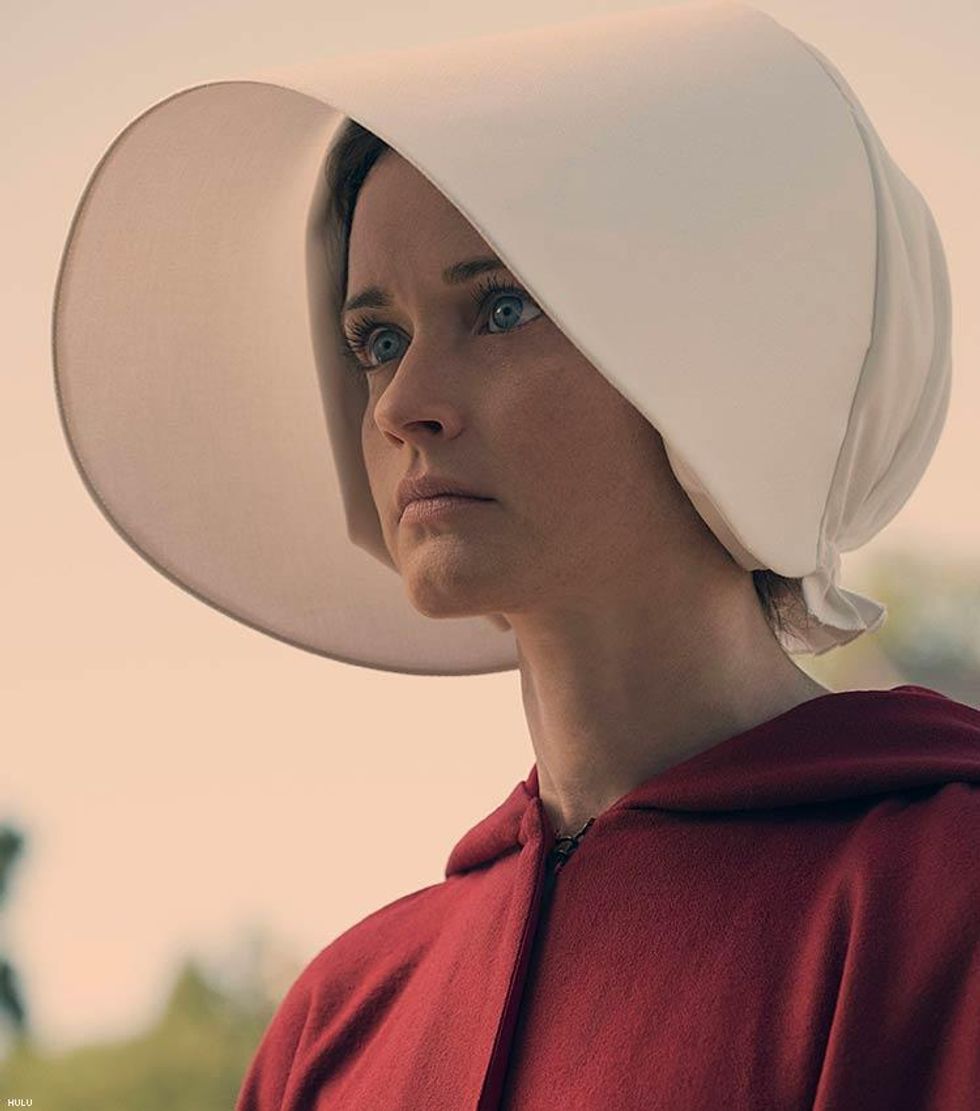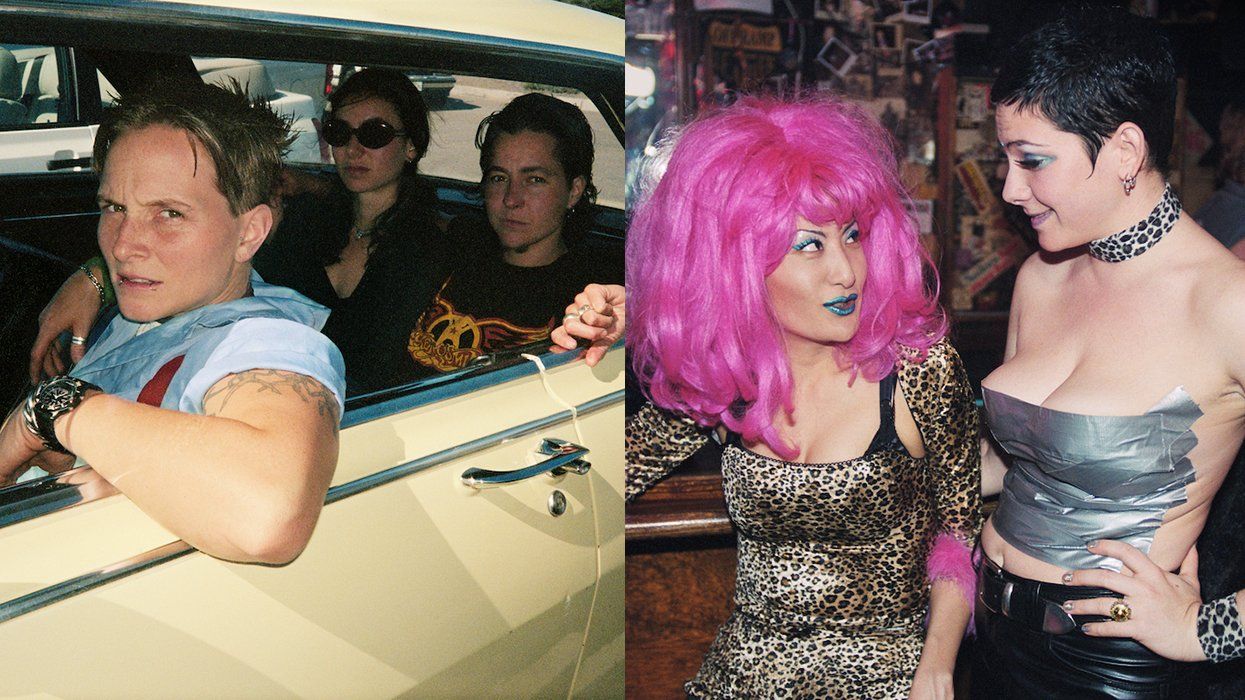Women haven't yet begun to greet one another by uttering "Blessed be the fruit," as those consigned to elite men for the sole purpose of procreation in Margaret Atwood's searing, prescient novel The Handmaid's Tale are forced to do. But since it became clear that a man who admitted to grabbing women without consent, and his polar opposite, a deeply religious ideologue who refuses to dine alone with any woman who's not his wife, began assailing women's rights with strokes of pens in rooms surrounded by aging white men, Atwood's world of the Republic of Gilead feels all too within the realm of possibility.
Since the first episodes of Hulu's 10-episode series based on the 1985 novel dropped last week, comparisons between the totalitarian government of the series and the Trump administration abound, especially in terms of women's rights and protections. Since taking office Donald Trump has halted funding to international organizations that provide or advise on abortions, sought to gut funding for Planned Parenthood, and rolled back workplace protections aimed at shielding women from unequal pay and sexual harassment. Correlations between the novel, which imagines a totalitarian government in which women are valued based on the viability of their reproductive organs, and the political climate of any given era since it was written have been drawn for 32 years now. But the series, starring Elisabeth Moss as Offred, the narrator whose journey as a quietly resistant handmaid the story follows in a current alternate United States of America, intersects with and diverges from Atwood's original work in ways that coincidentally reflect life under Trump.
"The book was written almost 35 years ago, and I think it was relevant then and it has been relevant throughout the years, but to see the time that we're living in now, to read the words in the book about what's happened in the Middle East and to live in this time, it's really astonishing," Samira Wiley, who plays Offred's lesbian best friend, the rebel handmaid Moira, said in a phone interview with The Advocate.
Devotees of Atwood's novel will immediately recognize where the series diverges from her original text beginning with the pilot episode. Some decisions like moving "the salvaging," a ceremony in which handmaids literally eviscerate a man accused of rape, from the end of Atwood's story to the first hour of the series were clearly made to heighten the series' narrative early on, but other changes are more firmly rooted in the here and now, based on progress or the lack thereof in American ideology since 1985.
"The story in its own right has always been powerful. But it is extraordinary now to be here and have the headlines coming out with women's rights and the photographs of men in a room deciding about women's rights with their bodies," Yvonne Strahovski, who plays Serena Joy, the villainous wife of the commander to whom Offred is assigned, told The Advocate via phone. "You watch the show and you can't help think of those things."
Among the most notable changes from book to small screen is that while people of color were banished to colonies in the white supremacist world of Atwood's Gilead, the series creator and showrunner Bruce Miller opted to create a racially diverse world in the series, both in flashbacks (Offred's husband is a man of color) and in Offred's present condition as a handmaid. Casting Orange Is the New Black star Wiley as Moira, a woman of color living in Gilead who's also tapped to be a handmaid, is a key change from Atwood's world in the book.
When Miller and the creative team of The Handmaid's Tale series were deciding which salient points of the novel could be updated, President Barack Obama was deep into his second term. There was no predicting that a reality TV host would win the Electoral College in 2016 and eventually name Jeff Sessions, a man accused of making racist remarks, as the country's attorney general. So while the creative decision reflects some progress in diversity in pop culture, Gilead's leaders aren't portrayed as racist to the same degree as they were in Atwood's novel.
Wiley said she spoke with Miller at length about the role of people of color in the novel versus the series and that the ultimate decision was made to make Gilead, which was essentially Boston before the uprising, reflect racial diversity. "What they wanted to do with this series is modernize it as much as they could. When the book came out it was this dystopian society set in the future, and that's not what we're trying to portray," Wiley said. "We're trying to portray this as in the now, as an alternate reality rather than in the future."
The queering of Gilead marks less of a change than an intensifying from novel to series, but its focus in the show is haunting. Atwood was ahead of her time when she wrote Moira as a fierce lesbian resisting the establishment at every turn, and in her Gilead, LGBT people were hanged for "gender treachery," but the series amplifies the terror felt LGBT people under the establishment, focusing on Moira's sexuality and adding a layer to Offred's fellow handmaid, the bold resistance fighter Ofglen, by portraying her as a lesbian and introducing possibly the most heartrending narrative of the series. By the third episode, Ofglen's horrifying story is front and center.
"In playing her I certainly felt that she had more at stake than some of the other handmaids, because, in Gilead, she would be deemed a gender traitor. She's a lesbian and they don't approve of her sexual orientation, so she's really vulnerable," Alexis Bledel (Gilmore Girls), who plays Ofglen, told The Advocate. "And she's in a great deal of danger, especially in being part of the resistance movement."
(RELATED: Our cover story with Samira Wiley, The Revolution Will Be Televised)
At this contradictory point in history "don't ask, don't tell" is a thing of the past and marriage equality is the law of the land, but Trump has rolled back protections for trans kids, has failed to comment on the horrors perpetrated against gay and bisexual men in Chechnya, and reportedly intends to issue a "religious freedom" order, actually a license to discriminate, that would effectively upend the lives of millions of queer people throughout the country. All this makes Ofglen's and Moira's resistance in the face of terror deeply unsettling to watch. Wiley, who is a lesbian, said that the all-too-real possibility of LGBT people losing rights and protections under the current administration weighed on her.
"Some of the language that's been used by our vice president and just people in power in this administration made it, for me, so scary, really scary," Wiley said of playing the part. "The only reason that Moira and Ofglen are still around is because their ovaries work," she said, noting that queer women made sterile by the environmental disaster that occurred prior to the fascist revolution would have been sent to the colonies to die.
"I haven't been around for the struggle of LGBT people as long as other people, but because of that, I think it's inconceivable," Wiley added. "But I do know my history. I do know the history of the people before me. It wasn't that long ago that people oppressed in this way."
In real life, as in Atwood's novel, which she's said drew its horror only from events that had actually occurred at some point in history, resistance is essential to survival. Like the millions who marched during the record-setting Women's March, which heralded the dawn of protests in the time of Trump, the characters of the novel and the series resist in ever-increasingly life-altering ways. Essential to that survival is naming the oppression, Wiley suggested.
"It [oppressing LGBT people] was really scary in a way that it makes me even scared to even talk about because in talking about it on set and giving voice to it made it real," Wiley said. "I realize now that is not the way to deal with things. The only thing that is going to make things better, the only thing that's going to make people [in power] talk about it is to give voice to it."
By the time the credits roll on The Handmaid's Tale's third episode, Ofglen has been outed as a "gender traitor" and subjected to unspeakable acts of emotional and physical torture and mutilation (that will starve her of sexual pleasure but not harm her chances of someday carrying her commander's offspring against her will) that are so disturbing, Bledel's costar Strahovski named those scenes as the most difficult of the series to watch.
"The moment that was hardest to digest was Ofglen's storyline," Strahovski said. "The brutality of that [mutilation] really struck me. It makes me tear up when I think about those scenes."
Despite the uncanny correlations to be drawn between the series and all that the Trump administration has wrought upon women, trans people, and LGBT people in the just over 100 days since he took office, Bledel said that she finds inspiration in Ofglen, who under grave conditions never ceases to fight back.
"I am inspired by her seemingly indomitable strength and fortitude under these conditions. Within herself, she's able to keep hold of what's right and that what's happening around her something that she's as surmountable somehow," Bledel said. "She has this hope within her that they can't diminish."


